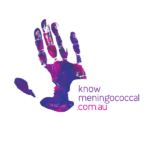

So many parents say that having a child is akin to allowing your heart to freely walk around outside your body.
It’s certainly a sentiment shared by model, author and TV presenter Kyly Clarke, whose main priority since becoming a mother to daughter Kelsey Lee a year and a half ago has been to ensure her child’s health and educate herself about childhood diseases.
This passion has led her to become an ambassador for Know Meningococcal, a newly launched campaign and website created to educate parents on what Meningococcal disease is, how to recognise the signs and symptoms of Meningococcal, how to understand who is the most at risk, and to make informed decisions around prevention and treatment.



